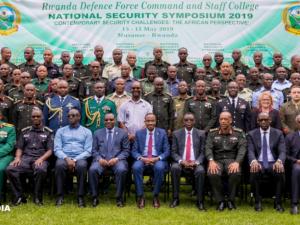
Leaders, experts urge stronger African voice on global arena
African leaders should pursue strong partnerships with western countries and other nations, such as Russia and China, in areas of security and development if the continent is to reverse the negative geopolitical narrative that dominates global media and other platforms.
The observation was made by officials and experts on the first day of the Seventh National Security Symposium in Musanze on Monday.
This was highlighted during a session dubbed: ‘Power Dynamics between Russia, China and the Western World: Implication on Security and Development in Africa’.
The panel included General James Kabarebe, the Presidential Senior Defence and Security Advisor, Minister for Justice and Attorney General Johnston Busingye, Minister for Infrastructure Amb. Claver Gatete, and Prof Adebayo Olukoshi, the International IDEA’s Regional Director for Africa and Western Asia programme.
Gen. Kabarebe said that the topic was so complex and can be analysed differently but stressed that Africa is still perceived as a victim.
“Looking at the topic you just see through it the usual narrative that Africa is a victim, pitiful and usual cry baby, a narrative that should really be reversed,” he said.
He said that security and development in Africa is approached through partnerships between African states and international organisations and partners.
He noted that; “The main partners for security and development can be split into several categories that I may term geopolitical actors, these are traditional western states, the traditional western organisations, non-traditional western states, traditional non-western states, new non-western states or new emerging states.”
All these states and organisations take different approaches and have different entities they promote abroad, he said, adding that they have different values and political orders that make Africa their geopolitical landscape.
The former Minister for Defence added that states must collaborate on a number of issues, which maybe through the United Nations, multilateral engagement, or blocs of likeminded nations.
“But the most important thing is how the leadership and African states approach partnerships in security with western states but also with Russia and China and it will definitely define the impact of security and development on the African countries,” he noted.
He noted that most obvious competition was between states with conflicting ideologies and approaches, especially if these are seen as the more powerful states militarily and economically.
“In this regard there is certainly a dynamic of intense competition between western states, on the one hand, and Russia and China, on the other, reflecting not only different approaches and agendas for African states but also differences in international and national politics,” Kabarebe noted.
According to Busingye, the continent is still in post-cold war era and there was a need to discuss more about how to come out of this.
“There is something called the West and there is something called East, and there is something called Africa. I have always asked myself why Africa is not part of the West and not part of the East, and at the same time what is Africa,” Busingye wondered.
He said Russia and China and western countries are trying to position themselves in a manner that they can keep exploiting Africa.
“Africa is 54 countries but India is one country, USA is one, China is one, Russia is one, I think these are dynamics we can’t do anything about but we always need to factor into our debate. Also, Africa and resources are good friends but also poverty and lack of development and these other issues that continue getting Africa on the lower end of the scale are also in Africa,” he noted.
According to Olukoshi, African countries have responded on the basis of their own national interests and capabilities.
“For Africa to enjoy the full benefits of the current dynamics, we need to put greater emphasis on a collective security approach for the continent,” he said.
The three-day conference was organised by the Rwanda Defence Force Command and Staff College in collaboration with the National University of Rwanda.
